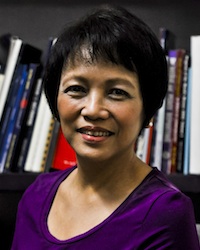
You wouldn’t know that you have this thing called courage until you are faced with a situation that calls for it. Courage lies somewhere deep in your reservoir of virtues – ready to be summoned when you need it.
Like a plant, it grows cultivated in the soil of your convictions, beliefs and passions. It needs rain and sunshine, too. These are the outside influences, the events and personalities in your external environment that shape you, add vigor to your ideals or lead to paths not commonly taken.
All this I’ve learned in my more than 30 years in journalism. But this is not my scoop, it is not exclusive to my profession.
It applies to many other callings, to accountants who, in their seeming mind-numbing work, muster the courage to say no when given an order to cook the books, risking their stable jobs.
To students who challenge their teachers’ arguments with facts and rigorous questioning because, in their hyper-partisanship, these supposed beacons of enlightenment tailor data to suit their politics.
To policemen and women who stand their ground, staying within the confines of the law, despite a culture of impunity engulfing their institution.
To government officials who speak truth to power, swim against the tide of group think and utter “no” when “yes” is the easiest answer.
August 1983
Here's my story and it begins in the newsroom of Business Day newspaper, where I worked as a reporter.
I didn’t start out in journalism thinking that this type of work would demand a kind of bold spirit. I never told myself that I was going to be brave, that I was going to write about conflict and the insurgency, corruption and wrongdoing in high places.
It was simply the excitement of being there, chronicling history as it unfolded, and knowing that there was an audience out there I could connect to.
But something happened that gave my work so much meaning. It fueled a desire to contribute to a cause bigger than day-to-day reporting: to regain lost freedoms.
It was in August 1983 when the country was jolted by a murder that triggered the unraveling of the Marcos dictatorship. Under the searing afternoon sun, opposition leader Ninoy Aquino was shot as he was stepping down from the airplane.
As my newspaper’s political reporter, I was assigned to cover the turbulence, from Left to Right. Thus, this tumultuous period leading to the first people power revolt in 1986 took me to the streets of Manila, where protest marches raged, to the lair of communist and Muslim rebels. Under the cover of night, we trekked to their camps, from Luzon to Mindanao.
I remember, in our coverage of a New People’s Army camp in Samar, a military helicopter hovered over the area and our armed guides ordered us to hide in the bushes. We ran for our lives and took cover as the helicopter lingered above us. I was tempted to flail my arms and raise my press ID hoping that would make me invincible.
But I realized that we were so vulnerable. That was one moment that gave me dread.
This period also took me to the forbidding offices of colonels and soldiers who were secretly planning a coup vs. President Marcos – as well as to the equally forbidding office of the Presidential Security Group in Malacañang.
Sense of danger
To my surprise, I discovered I had little fear. My feeling of intimidation gave way to adrenaline coursing through my veins.

How did it happen that my sense of danger was close to zero? It must have been the urgency of the circumstances, the consensus that the Marcos regime had to end, that we had to regain our democracy. I saw my reporting as a strand in this vast tapestry.
After our country basked in its freedoms in 1986, this weak sense of peril held on as I continued my work, reporting on how our politics was a major force behind the denudation of our forests or how the Supreme Court justices breached ethics, doing the country an epic disservice as the final arbiter of conflict.
The bad news was: my sense of judgment didn’t please everybody. The reactions of powerful people ranged from libel suits to death threats.
In the age before social media, we got threats via landline telephone calls and text messages. Even more scary, a colleague received a funeral wreath in her home. Unmarked vehicles parked outside our office (Newsbreak magazine) for long stretches were obviously meant to keep us under surveillance.
Newsrooms have protocols to cope with these challenges. Journalists go through sleepless nights but find their equanimity again, able to continue their reporting.
Today, threats are easily dished out in social media, not only to journalists, but to everyone else, because anonymity enables people to hide behind masks and false names. It makes cowards thrive. Anonymity has become the great enabler.
But whatever form the threats take and in whatever environment – under a dictatorship or a polarized environment high on impunity – this virtue called courage remains. It’s a constant, ready for you to rouse. – Rappler.com